- Clone
- 30-F11 (See other available formats)
- Regulatory Status
- RUO
- Other Names
- T200, Ly-5, LCA
- Isotype
- Rat IgG2b, κ
- Ave. Rating
- Submit a Review
- Product Citations
- publications
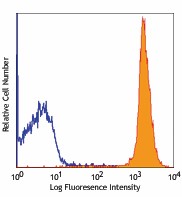
-

C57BL/6 mouse splenocytes stained with 30-F11 PerCP
| Cat # | Size | Price | Quantity Check Availability | Save | ||
|---|---|---|---|---|---|---|
| 103129 | 25 µg | 86€ | ||||
| 103130 | 100 µg | 234€ | ||||
CD45 is a 180-240 kD glycoprotein also known as the leukocyte common antigen (LCA), T200, or Ly-5. It is a member of the protein tyrosine phosphatase (PTP) family, expressed on all hematopoietic cells except mature erythrocytes and platelets. There are different isoforms of CD45 that arise from variable splicing of exons 4, 5, and 6, which encode A, B, and C determinants, respectively. CD45 plays a key role in TCR and BCR signal transduction. These isoforms are very specific to the activation and maturation state of the cell as well as cell type. The primary ligands for CD45 are galectin-1, CD2, CD3, CD4, TCR, CD22, and Thy-1.
Product DetailsProduct Details
- Verified Reactivity
- Mouse
- Antibody Type
- Monoclonal
- Host Species
- Rat
- Immunogen
- Mouse thymus or spleen
- Formulation
- Phosphate-buffered solution, pH 7.2, containing 0.09% sodium azide.
- Preparation
- The antibody was purified by affinity chromatography, and conjugated with PerCP under optimal conditions.
- Concentration
- 0.2 mg/ml
- Storage & Handling
- The antibody solution should be stored undiluted between 2°C and 8°C, and protected from prolonged exposure to light. Do not freeze.
- Application
-
FC - Quality tested
- Recommended Usage
-
Each lot of this antibody is quality control tested by immunofluorescent staining with flow cytometric analysis. For flow cytometric staining, the suggested use of this reagent is ≤ 0.25 µg per 106 cells in 100 µl volume. It is recommended that the reagent be titrated for optimal performance for each application.
* PerCP has a maximum absorption of 482 nm and a maximum emission of 675 nm. - Excitation Laser
-
Blue Laser (488 nm)
- Application Notes
-
Clone 30-F11 reacts with all isoforms and both CD45.1 and CD45.2 alloantigens of CD45.
Additional reported applications (for relevant formats) include: immunoprecipitation3, complement-dependent cytotoxicity1,5, immunohistochemistry (acetone-fixed frozen sections, zinc-fixed paraffin-embedded sections and formalin-fixed paraffin-embedded sections)4,6, Western blotting7, and spatial biology (IBEX)10,11. The Ultra-LEAF™ purified antibody (Endotoxin < 0.01 EU/µg, Azide-Free, 0.2 µm filtered) is recommended for functional assays (Cat. No. 103163 and 103164). - Application References
-
- Podd BS, et al. 2006. J. Immunol. 176:6532. (FC, CMCD) PubMed
- Haynes NM, et al. 2007. J. Immunol. 179:5099. (FC)
- Ledbetter JA, et al. 1979. Immunol. Rev. 47:63. (IP)
- Simon DI, et al. 2000. J. Clin. Invest. 105:293. (IHC)
- Seaman WE. 1983. J. Immunol. 130:1713. (CMCD)
- Cornet A, et al. 2001. P. Natl. Acad. Sci. USA 98:13306. (IHC)
- Tsuboi S and Fukuda M. 1998. J. Biol. Chem. 273:30680. (WB) PubMed
- Liu F, et al. 2012. Blood. 119:3295. PubMed
- Pelletier AN, et al. 2012. J. Immunol. 188:5561. PubMed
- Radtke AJ, et al. 2020. Proc Natl Acad Sci U S A. 117:33455-65. (SB) PubMed
- Radtke AJ, et al. 2022. Nat Protoc. 17:378-401. (SB) PubMed
- Product Citations
-
- RRID
-
AB_893343 (BioLegend Cat. No. 103129)
AB_893339 (BioLegend Cat. No. 103130)
Antigen Details
- Structure
- Protein tyrosine phosphatase (PTP) family, 180-240 kD
- Distribution
-
All hematopoietic cells except mature erythrocytes and platelets
- Function
- Phosphatase, T and B cell activation
- Ligand/Receptor
- Galectin-1, CD2, CD3, CD4, TCR, CD22, Thy-1
- Cell Type
- B cells, Dendritic cells, Mesenchymal Stem Cells, Tregs
- Biology Area
- Cell Biology, Immunology, Inhibitory Molecules, Innate Immunity, Neuroscience, Neuroscience Cell Markers, Stem Cells
- Molecular Family
- CD Molecules
- Antigen References
-
1. Barclay A, et al. 1997. The Leukocyte Antigen FactsBook Academic Press.
2. Trowbridge IS, et al. 1993. Annu. Rev. Immunol. 12:85.
3. Kishihara K, et al. 1993. Cell 74:143.
4. Pulido R, et al. 1988. J. Immunol. 140:3851. - Gene ID
- 19264 View all products for this Gene ID
- UniProt
- View information about CD45 on UniProt.org
Related FAQs
- How stable is PerCP/Cyanine5.5 tandem as compared to PerCP alone?
-
PerCP/Cyanine5.5 is quite photostable and also better than PerCP alone in withstanding fixation.
Other Formats
View All CD45 Reagents Request Custom ConjugationCustomers Also Purchased
Compare Data Across All Formats
This data display is provided for general comparisons between formats.
Your actual data may vary due to variations in samples, target cells, instruments and their settings, staining conditions, and other factors.
If you need assistance with selecting the best format contact our expert technical support team.
-
APC anti-mouse CD45
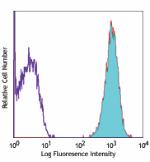
C57BL/6 mouse splenocytes stained with 30-F11 APC -
Biotin anti-mouse CD45
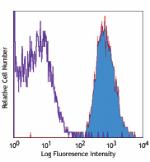
C57BL/6 mouse splenocytes stained with biotinylated 30-F11, ... -
FITC anti-mouse CD45
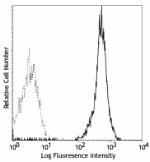
C57BL/6 splenocytes stained with 30-F11 FITC -
PE anti-mouse CD45
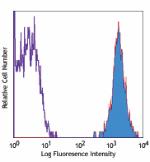
C57BL/6 mouse splenocytes stained with 30-F11 PE 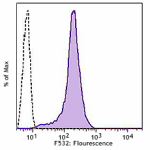
C57BL/6 mouse splenocytes were stained with CD45 (clone 30-F... -
PE/Cyanine5 anti-mouse CD45
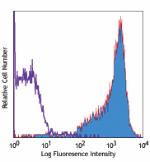
C57BL/6 mouse splenocytes stained with 30-F11 PE/Cyanine5 -
Purified anti-mouse CD45
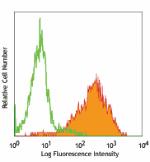
BALB/c splenocytes stained with 30-F11 purified, followed by... 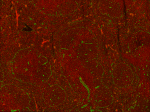
Fresh, frozen mouse spleen was stained with purified CD45 cl... -
PE/Cyanine7 anti-mouse CD45
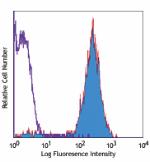
C57BL/6 mouse splenocytes stained with 30-F11 PE/Cyanine7 -
APC/Cyanine7 anti-mouse CD45
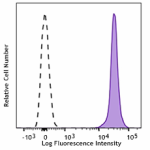
C57BL/6 splenocytes were stained with CD45 (clone 30-F11) AP... -
Alexa Fluor® 488 anti-mouse CD45
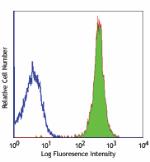
C57BL/6 mouse splenocytes stained with 30-F11 Alexa Fluor® 4... 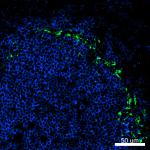
Confocal image of C57BL/6 mouse spleen sample acquired using... -
Alexa Fluor® 647 anti-mouse CD45
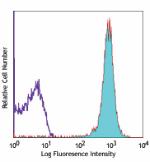
C57BL/6 mouse splenocytes stained with 30-F11 Alexa Fluor® 6... 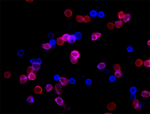
C57 mouse bone marrow cells were fixed with 2% paraformaldeh... 
Paraformaldehyde-fixed (4%), mouse intestine tissue section ... 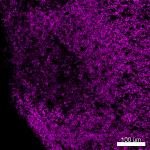
Mice were injected subcutaneously with sheep red blood cells... -
Pacific Blue™ anti-mouse CD45
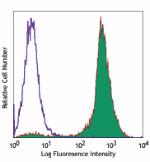
C57BL/6 mouse splenocytes stained with Pacific Blue™ 3... -
Alexa Fluor® 700 anti-mouse CD45
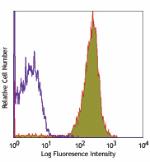
C57BL/6 mouse splenocytes stained with 30-F11 Alexa Fluor® ... 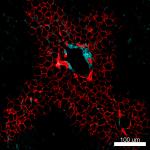
Confocal image of C57BL/6 mouse liver sample acquired using ... -
PerCP/Cyanine5.5 anti-mouse CD45
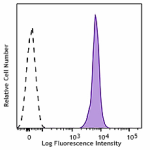
C57BL/6 mouse splenocytes were stained with CD45 (Clone 30-F... -
PerCP anti-mouse CD45
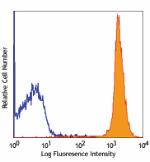
C57BL/6 mouse splenocytes stained with 30-F11 PerCP -
Alexa Fluor® 594 anti-mouse CD45
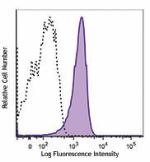
C57BL/6 mouse splenocytes were stained with CD45 (clone 30-F... 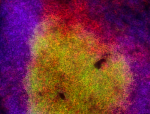
C57BL/6 mouse frozen lymph node section was fixed with 4% pa... 
Paraformaldehyde-fixed (4%), 500 μm-thick mouse lung section... -
Brilliant Violet 421™ anti-mouse CD45
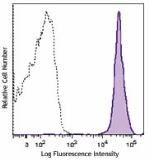
C57BL/6 mouse splenocytes were stained with CD45 (clone 30-F... -
Brilliant Violet 570™ anti-mouse CD45
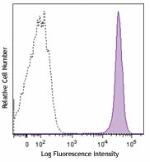
C57BL/6 mouse splenocytes were stained with CD45 (clone 30-F... -
Brilliant Violet 510™ anti-mouse CD45
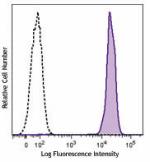
C57BL/6 mouse splenocytes were stained with CD45 (clone 30-F... -
Brilliant Violet 605™ anti-mouse CD45
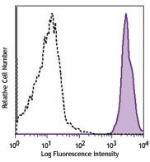
C57BL/6 mouse splenocytes were stained with CD45 (clone 30-F... -
Purified anti-mouse CD45 (Maxpar® Ready)
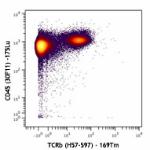
Mouse splenocytes stained with 175Lu-anti-CD45 (30-F11) and ... -
PE/Dazzle™ 594 anti-mouse CD45
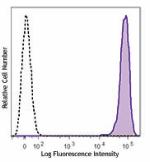
C57BL/6 mouse splenocytes were stained with CD45 (clone 30-F... -
Brilliant Violet 711™ anti-mouse CD45
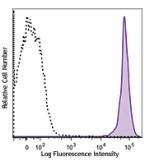
C57BL/6 mouse splenocytes were stained with CD45 (clone 30-F... -
Brilliant Violet 785™ anti-mouse CD45
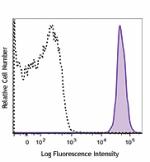
C57BL/6 mouse splenocytes were stained with CD45 (clone 30-F... -
Brilliant Violet 650™ anti-mouse CD45
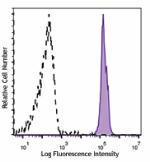
C57BL/6 mouse splenocytes were stained with CD45 (clone 30-F... -
APC/Fire™ 750 anti-mouse CD45
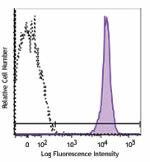
C57BL/6 splenocytes were stained with CD45 (clone 30-F11) AP... -
Brilliant Violet 750™ anti-mouse CD45
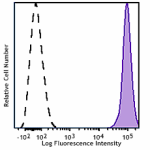
C57BL/6 mouse splenocytes were stained with CD45 (clone 30-F... -
TotalSeq™-A0096 anti-mouse CD45
-
TotalSeq™-B0096 anti-mouse CD45
-
Ultra-LEAF™ Purified anti-mouse CD45
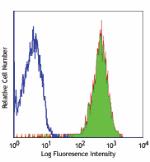
C57BL/6 mouse splenocytes stained with LEAF™ purified 30-F11... -
Spark Blue™ 550 anti-mouse CD45
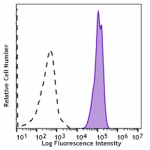
C57BL/6 mouse splenocytes were stained with CD45 (clone 30-F... -
Spark NIR™ 685 anti-mouse CD45
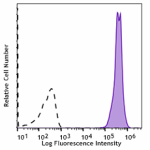
C57BL/6 mouse splenocytes were stained with CD45 (clone 30-F... -
TotalSeq™-C0096 anti-mouse CD45
-
Spark YG™ 570 anti-mouse CD45
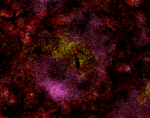
C57BL/6 mouse frozen spleen section was fixed with 4% parafo... -
PE/Fire™ 640 anti-mouse CD45
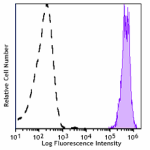
C57BL/6 splenocytes were stained with CD45 (clone 30-F11) PE... -
APC/Fire™ 810 anti-mouse CD45
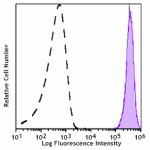
C57BL/6 splenocytes were stained with CD45 (clone 30-F11) AP... -
PE/Fire™ 700 anti-mouse CD45
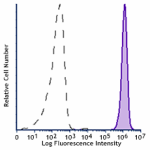
C57BL/6 mouse splenocytes were stained with anti-mouse CD45 ... -
Spark Violet™ 538 anti-mouse CD45
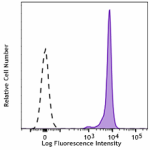
C57 mouse splenocytes were stained with mouse CD45 (clone 30... -
Spark YG™ 593 anti-mouse CD45
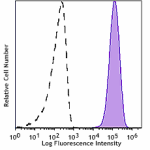
C57BL/6 splenocytes were stained with anti-mouse CD45 (clone... -
Spark Blue™ 574 anti-mouse CD45 Antibody
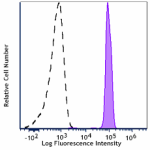
C57BL/6 mouse splenocytes were stained with anti-mouse CD45 ... -
Spark Blue™ 515 anti-mouse CD45

C57BL/6 mouse splenocytes were stained with anti-mouse TER-1... -
Spark UV™ 387 anti-mouse CD45

C57BL/6 mouse splenocytes were stained with anti-mouse CD45 ... -
PE/Fire™ 810 anti-mouse CD45
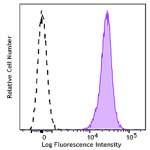
C57BL/6 mouse splenocytes were stained with anti-mouse CD45 ... -
Spark Red™ 718 anti-mouse CD45 (Flexi-Fluor™)
-
Spark PLUS UV395™ anti-mouse CD45
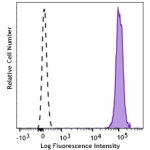
C57BL/6 splenocytes were stained with anti-mouse CD45 (clone...
 Login / Register
Login / Register 










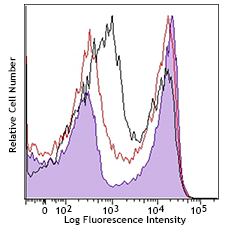
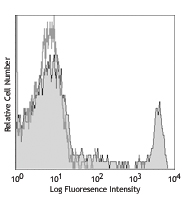
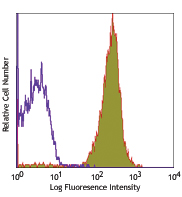
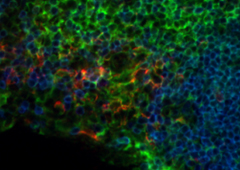



Follow Us